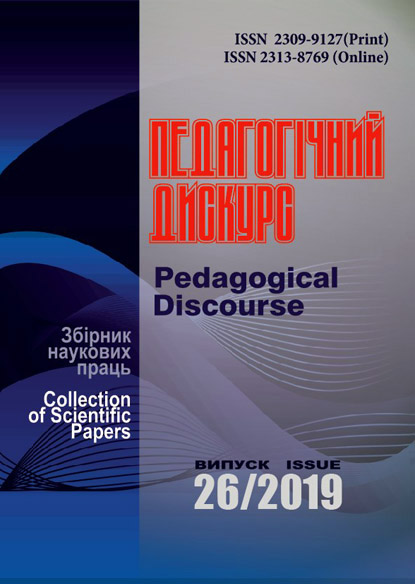Forms of Involvement of Gifted Students in Research Work in the East Ukrainian Region (End of the 20th – Beginning of the 21st Century)
Abstract
The article deals with the organization of research work of senior school students as a means of providing pedagogical provision for the gifted. The experience of educational establishments of the East Ukrainian region is shown on the example of the lyceum of Donetsk National University, Luhansk Oblast Junior Academy of Sciences, Dobropillia branch of the Junior Academy of Sciences, the history museum of Bakhmut of Donetsk oblast, and Mariupol city technological lyceum.
The main tasks of the research work of gifted children have been defined. Factors influencing the research work of schoolchildren, the role of the scientific supervisor, and the work of the lyceum scientific society have been analysed. The role of regional branches of the Junior Academy of Sciences in pedagogical provision of the gifted has been considered, namely, their goals, organisational forms, and achievements.
The key conditions influencing the efficiency of research work of gifted schoolchildren, typology of scientific supervisors have been highlighted; examples of the main organizational forms of involving senior high school students in research work have been given. They include: Junior Academy of Sciences of Ukraine, scientific societies and schools of young researchers, research projects as a part of lyceum curriculum, conferences, colloquiums, seminars, meetings with leading scholars, and participation in conducting joint research with students of higher educational institutions.
The basics of students’ scientific research work have been developed by teachers and scientists of the first lyceums in Ukraine, which are based on the idea of the creative personality and understanding of the lyceum as a pedagogical system that is intended to train students for scientific and practical activity.
Senior students’ research work stimulates interest, develops critical thinking and responsibility, develops confidence and communication skills, helps in their professional orientation, and provides creative self-realization.
Downloads
References
Алфімов, В. М. (1997). Педагогічні основи організації навчально-виховного процесу в ліцеї. (Дис. д-ра пед. наук). Ін-т педагогіки АПН України, Київ / Alfimov, V. M. (1997). Pedahohichni osnovy orhanizatsii navchalno-vykhovnoho protsesu v litsei [Pedagogical Bases of Organization of Educational Process in Lyceum]. (Dys. d-ra ped. nauk). In-t pedahohiky APN Ukrainy, Kyiv [in Ukrainian].
Андрющук, А. О. (2000). Дидактичні засади роботи з обдарованою учнівською молоддю, яка професійно зорієнтована на наукову діяльність. Вісн. Луган. держ. пед. ун-ту імені Тараса Шевченка, 1, пед. науки, 8-11 / Andriushchuk, A. O. (2000). Dydaktychni zasady roboty z obdarovanoiu uchnivskoiu moloddiu, yaka profesiino zoriientovana na naukovu diialnist [Didactic Principles of Work with Gifted Students, who are Professionally Focused on Scientific Activity]. Visn. Luhan. derzh. ped. un-tu imeni Tarasa Shevchenka, 1, ped. nauky, 8-11 [in Ukrainian].
Антонова, О. Є. (2011). Мала академія наук України як засіб розвитку дослідницьких здібностей старшокласників. Освіта обдарованої та талановитої молоді – національна проблема: матеріали всеукраїнської конференції 1 грудня 2011 р. (Ч.1). Київ: Ін-т обдарованої дитини НАПН України, 15-22 / Antonova, O. Ye. (2011). Mala akademiia nauk Ukrainy yak zasib rozvytku doslidnytskykh zdibnostei starshoklasnykiv [Junior Academy of Sciences of Ukraine as a Means of Developing Research Skills of Senior Pupils]. Osvita obdarovanoi ta talanovytoi molodi – natsionalna problema: materialy vseukrainskoi konferentsii 1 hrudnia 2011 r. (Ch.1). Kyiv: In-t obdarovanoi dytyny NAPN Ukrainy, 15-22 [in Ukrainian].
Бардаш, О. Ю. (2013). Виховні технології стимулювання науково-дослідницької роботи учнів у Луганській обласній малій академії наук учнівської молоді. Наукова еліта у розвитку держав, Київ, 2, 5-11 / Bardash, O. Yu. (2013). Vykhovni tekhnolohii stymuliuvannia naukovo-doslidnytskoi roboty uchniv u Luhanskii oblasnii malii akademii nauk uchnivskoi molodi [Educational Technologies for Stimulating Research Work of Pupils in Luhansk Regional Junior Academy of Sciences of Students]. Naukova elita u rozvytku derzhav, Kyiv, 2, 5-11 [in Ukrainian].
Євтухова, О. (2005). Науково-дослідна робота ліцеїстів. Рідна школа, 5, 17-18 / Yevtukhova, O. (2005). Naukovo-doslidna robota litseistiv [Research Work of Lyceum Students]. Ridna shkola, 5, 17-18 [in Ukrainian].
Корнацький, І. А. (2013). Стимулювання пізнавальної активності учнів у відділенні історії Малої академії наук. Наукова еліта у розвитку держав, Київ, 2, 109-112 / Kornatskyi, I. A. (2013). Stymuliuvannia piznavalnoi aktyvnosti uchniv u viddilenni istorii Maloi akademii nauk [Stimulation of Cognitive Activity of Students in the Department of History of the Junior Academy of Sciences]. Naukova elita u rozvytku derzhav, Kyiv, 2, 109-112 [in Ukrainian].
Кулігіна, О. В. (2017). Імерсія як метод організації науково-дослідницької діяльності учнів. Розвиток обдарованості дітей в умовах інноваційного освітнього простору, Івано-Франківськ. Київ: Інститут обдарованої дитини, 156-163 / Kulihina, O. V. (2017). Imersiia yak metod orhanizatsii naukovo-doslidnytskoi diialnosti uchniv [Immersion as a Method of Organization of Research Work of Students]. Rozvytok obdarovanosti ditei v umovakh innovatsiinoho osvitnoho prostoru, Ivano-Frankivsk. Kyiv: Instytut obdarovanoi dytyny, 156-163 [in Ukrainian].
Copyright (c) 2019 Pedagogical Discourse

This work is licensed under a Creative Commons Attribution-NonCommercial-ShareAlike 4.0 International License.

















